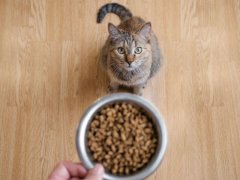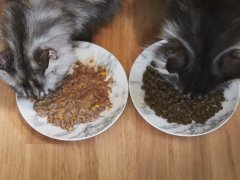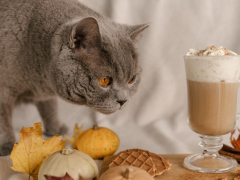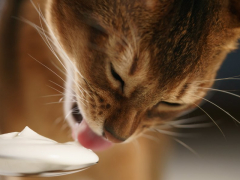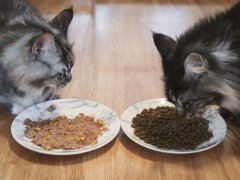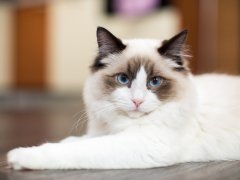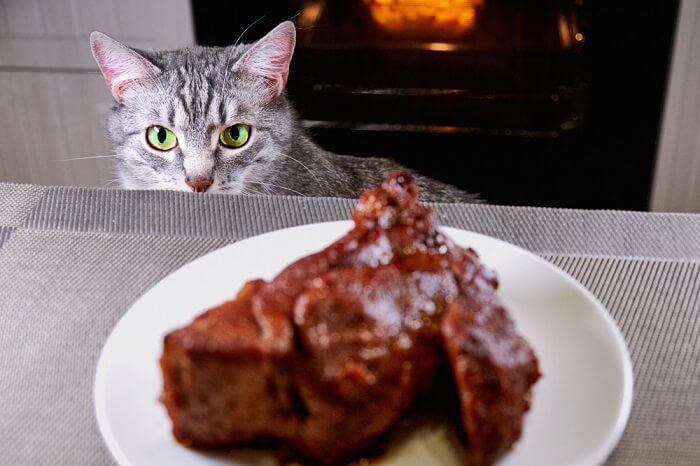
Cat owners know that proper nutrition is essential for our cat’s health and well-being.
More often, choosing the right cat food can be overwhelming, with so many brands and types, when all we want is one that is tasty and gives the right number of nutrients our cat needs. A frequently asked question at many veterinary practices is whether your cat can and should eat meat (and especially raw meat).
Well, you should always remember that your cat will benefit from eating a raw and, more importantly, fresh diet. Unlike dogs, domestic cats are not used to eating anything but fresh meat. Cats are obligate carnivores, so they need to eat meat.
Therefore, feeding your cat steak as part of their diet, is one of the best things you can do for them.
Can Cats Have Steak?
The simple answer to this question is yes! Your cat can eat steak in moderation. In fact, red meat is one of the safest meat selections for your furry friend.
However, if you want your cat to be healthy, strong, and happy, it is always recommended to feed a diet that is a combination of meat and high-quality cat food. This will give your cat all the nutrients it needs to be healthy, whilst providing your pet with essential nutrients.
Cats being carnivores mean that the protein they get from the animal meat is the only type of protein that will fulfil their nutritional need, so in other words, a high-quality cat food should have all the correct nutrition that your cat needs.
To make sure it is suitable to introduce a new food to your cat’s diet, always check with your veterinary surgeon who will review any health problems they have.
Is Steak Good for Cats?
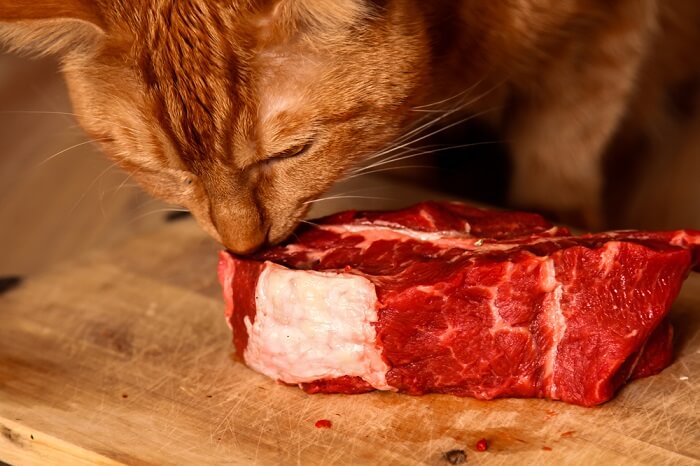
Steak contains many nutrients for a healthy cat, but it is important that your cat does not have any nutritional imbalances, so never replace their normal cat food with a steak only diet.
Steak, while healthy for cats, will not meet all the dietary needs than that of a cat food which is specifically formulated for cats.
If you are considering changing your cat’s diet to only include one whole food, please seek the advice of your veterinary surgeon in the first instance.
As obligate carnivores, cats benefit hugely from animal protein, in fact a cat’s body has been designed to process foods that are rich in animal protein, which is one of the reasons why a high protein steak is so good for cats.
Protein
Proteins are essential macro-nutrients which act as building blocks in the tissues of the muscles and organs of all animals. They produce energy when digested. Proteins also provide a functional role in the body, including enzymes, hormones, and antibodies. These play a pivotal role so need to be regularly replaced by consuming good quality food, like steak.
Better Dental Health
Raw chunks of steak (The cheaper cuts are chewier) which will encourage your cat to work harder to chew, is beneficial to the teeth and gums.
Healthy Coats
Some owners have noticed that feeding a meat diet to their cats has resulted in better coat quality, causing less shedding of the fur and potentially fewer hairballs. The meat in their diet contributes to the unsaturated fatty acids omega three and omega six, which is fundamental for good coat condition.
Energy Levels
After adding good quality meat to cat food, owners notice how much more energy their cats have. Cats can utilize proteins, turning to energy in their liver, which in turn may help your cat lose weight, should they be obese.
Improved Digestion
A cat’s digestive system is adapted to eat a meat-based diet.
Its digestive system is short and acidic meaning that they can efficiently digest food in twelve hours, resulting in a better stool quality.
Vitamin Improvement
As with all lean meat, steak has high levels of iron, zinc, and phosphorus as well as B complex vitamins like vitamin B6 and vitamin B12.
Whilst each of these contributes to your cat’s overall health and growth, vitamin B12 gets a special mention. Vitamin B12 promotes the health of your cat’s nervous system, digestive system and immune system.
Also known as cobalamin, Vitamin B12 is critical for a cat’s health, including their nervous system, immune system, and their digestive tract. While felines do not produce their own B12, they can absorb this vitamin through their food.
Sick and elderly cats may not be able to absorb enough Vitamin B12 that’s present in their food. The absorption process is a complex one that takes the work of the small intestine, liver, stomach, and pancreas. If one of these organs is not functioning properly, the less Vitamin B12 is absorbed by your cat.
Some signs of a vitamin B12 deficiency in cats include vomiting, weight loss, lethargy and diarrhea. If your cat is not absorbing enough then B12 supplements and some well-cooked lean steak, served daily, may help.
Also Read: 8 Best Cat Vitamins and Supplements
Is Steak Bad for Cats?
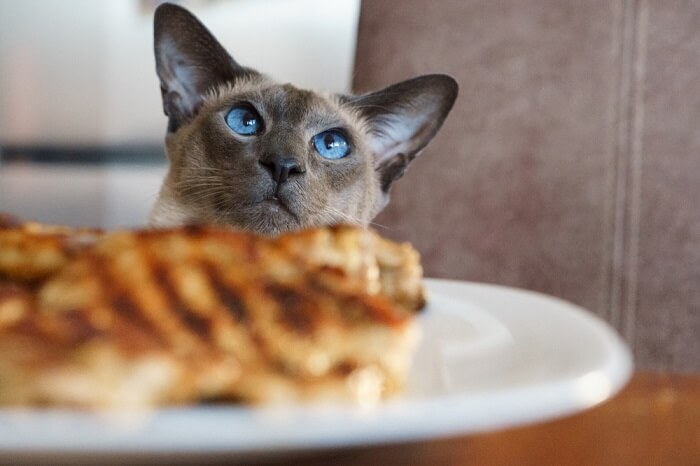
Whilst there is nothing wrong with giving your cat steak as a treat or in moderation (alongside their normal feline food), you must feed a plain steak that contains no fat or bones.
Both meaty substances can be dangerous to cats. Fat, both raw and uncooked, can cause health issues, including diarrhea, vomiting, and other intestinal upsets.
Additionally, too much fat (or worse, fat trimmings) can lead to additional health issues such as obesity and pancreatitis. Obesity leads to a heightened risk of feline diabetes.
Usually, the more weight a cat carries then the increased likelihood of diabetes and other health issues.
Cats can also choke on bones and splinters can cut them internally or cause obstructions.
So, remember, if you want to give your cat steak, that is fine, but dice the steak small enough for your cat to eat, and check for bones!
Besides from fat on the steak, do not give your cat steak that contains a high amount of salt or spices like onion and garlic.
Onions are toxic because they contain thiosulphate, which has the potential to damage a cat’s red blood cells. This vegetable is toxic in all forms, from raw to cooked and even onion powder.
Can Cats Eat Raw Steak?
Cats can eat raw steak, but it should be part of a balanced diet that includes other supplements to ensure they receive all necessary nutrients. Feeding a cat only raw steak can lead to nutritional deficiencies, so it’s important to consult with a veterinarian for a complete and safe raw diet plan.
If you choose to give your cat raw steak, it is advisable to find a diet by a reputable brand or one that has been formulated by a veterinary nutritionist. Always make sure it is prepared correctly and always take hygiene precautions.
Can Cats Eat Steak Fat?
Cats can eat steak fat both raw or cooked, and it typically serves as a good source of energy for them as obligate carnivores. However, it should be given in moderation to avoid potential health issues like obesity or pancreatitis. For most cats, a daily intake of 5-15 grams would be a reasonable amount, but this should be considered as part of a complete diet and factored into your cat’s daily caloric intake.
